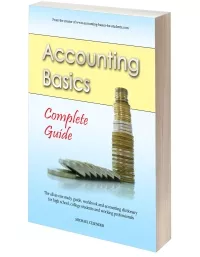The Basic Accounting Equation:
Another Viewpoint
Previous lesson: Double Entry Accounting
Next lesson: Debits and Credits
Check your understanding of this lesson by taking the quiz in the Test Yourself! section further below. And right at the bottom of the page, you can find more questions on the topic submitted by fellow students.
There is another viewpoint one can take of the basic accounting equation and what is known as the five elements of accounting...
Have you ever heard of the terms financing and investing?

Financing is the act of getting money. Financing means where you get your money from. Financing is the source of money.
Investing is the spending of money.
But to spend money one would need to have it first. Thus one would always need financing to occur first before engaging in any investing activities.
Financing can be obtained from the owner or from a lender (such as the bank). Financing can also be obtained internally from the profit you make.
One can spend money on (invest in) things that provide only immediate benefits, or in things that provide continuing benefits into the future.
How do the above statements relate to the accounting equation?
Well, the elements on the right side show where money comes from. These are the sources of finance. Equity and liabilities are external sources of finance. Income is the business itself creating finance for more assets.
The two items that increase on the left side show what has been invested in. One can invest in items that provide immediate benefits only (expenses) or continuing benefits (assets).
The water bill for January (for example) is an expense as the benefits for that month have been immediately consumed and there will be no more benefits arising from the January water bill in future (the water bill for February is a separate expense that will be paid later and that will provide benefits specifically for February).
In contrast to this, a construction vehicle purchased in January is an asset as it will provide benefits for the business well beyond January.
So we have an alternate view.
Pretty interesting, huh?
Test Yourself!
Before you start, I would recommend to time yourself to make sure that you not only get the questions right but are completing them at the right speed.
Difficulty Rating:
Beginner
Quiz length:
3 questions
Time limit:
4 minutes
Important: The solution sheet on the following page only shows the solutions and not whether you got each of the questions right or wrong. So before you start, get yourself a piece of paper and a pen to write down your answers. Once you're done with the quiz and writing down your answers, click the Check Your Answers button at the bottom and you'll be taken to our page of solutions.
Good luck!
Return from The Basic Accounting Equation: Another Viewpoint to Double Entry Accounting
Return from The Basic Accounting Equation: Another Viewpoint to the Home Page
Stay up to date with ABfS!
Follow us on Facebook:
Previous lesson: Double Entry Accounting
Next lesson: Debits and Credits
Questions Relating to This Lesson
Click below to see questions and exercises on this same topic from other visitors to this page... (if there is no published solution to the question/exercise, then try and solve it yourself)
Double Entry Example
Q: Could you please show me an example of how a double entry should look?
A: Take a look at this lesson, which shows the double entry for an equity …
Journal Entry - Money Order
Q: What is the entry for the following:
Money order sent to Mohan - worth 500 Rupees. Money order commission of 10 Rupees.
Basic Accounting Quiz:
Capital Expenditure vs Revenue in Nature
Before you begin: For purposes of testing and exams it's important to make sure you not only answer correctly but do so at the right speed. Use a watch …
© Copyright 2009-2023 Michael Celender. All Rights Reserved.
Click here for Privacy Policy.







Comments
Have your say about what you just read! Leave me a comment in the box below.